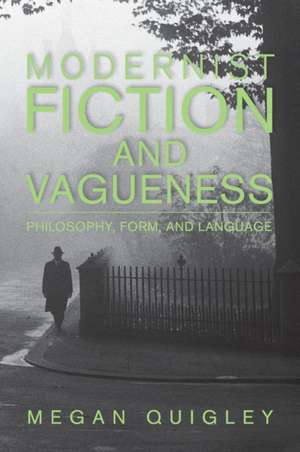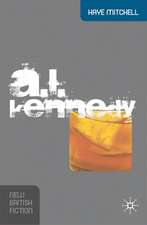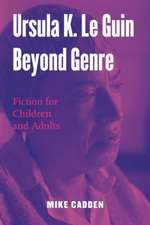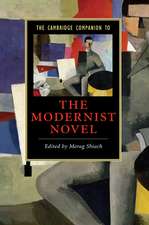Modernist Fiction and Vagueness: Philosophy, Form, and Language
Autor Megan Quigleyen Limba Engleză Paperback – 24 iul 2018
| Toate formatele și edițiile | Preț | Express |
|---|---|---|
| Paperback (1) | 284.01 lei 6-8 săpt. | |
| Cambridge University Press – 24 iul 2018 | 284.01 lei 6-8 săpt. | |
| Hardback (1) | 692.50 lei 6-8 săpt. | |
| Cambridge University Press – feb 2015 | 692.50 lei 6-8 săpt. |
Preț: 284.01 lei
Nou
Puncte Express: 426
Preț estimativ în valută:
54.35€ • 56.15$ • 45.23£
54.35€ • 56.15$ • 45.23£
Carte tipărită la comandă
Livrare economică 25 martie-08 aprilie
Preluare comenzi: 021 569.72.76
Specificații
ISBN-13: 9781107461154
ISBN-10: 1107461154
Pagini: 242
Dimensiuni: 153 x 228 x 15 mm
Greutate: 0.36 kg
Editura: Cambridge University Press
Colecția Cambridge University Press
Locul publicării:New York, United States
ISBN-10: 1107461154
Pagini: 242
Dimensiuni: 153 x 228 x 15 mm
Greutate: 0.36 kg
Editura: Cambridge University Press
Colecția Cambridge University Press
Locul publicării:New York, United States
Cuprins
Preface; Acknowledgments; Introduction: linguistic turns and literary modernism; 1. 'The Re-instatement of the Vague': the James Brothers and Charles S. Peirce; 2. When in December 1910?: Virginia Woolf, Bertrand Russell, and the question of vagueness; 3. A dream of international precision: James Joyce, Ludwig Wittgenstein, and C. K. Ogden; 4. Conclusion. To criticize the criticism: T. S. Eliot and the eradication of vagueness; Notes; Index.
Recenzii
'… deeply engaging … persuasive … an illuminating reassessment …' David James, The Times Literary Supplement
'Megan Quigley has succeeded in two ways. Her book is not only a wholly succinct review of the element of vagueness in modernist writing, but a work which inspires readers to discover for themselves new connections between philosophy and literature.' Martin Glick, OCCT Review
'The philosophic and literary figures in this book have long been canonical and so long been the subjects of critical industries; Quigley provides not only new ways to read them, but also, in her thorough bibliographic work, a resource for literary scholars … This is a book that is both dense with information and still a pleasure to read.' Johanna Winant, Modernism/modernity
'Modernist Fiction and Vagueness offers a compelling new interdisciplinary approach through which to account for the relationship between English language literary modernism and the two predominant countervailing forces in twentieth-century Anglo-American philosophy.' Karen Zumhagen-Yekplé, Woolf Studies Annual
'Modernist Fiction and Vagueness affords us a rich and nuanced portrait of a conceptual quandary - equal parts philosophical and literary - that in its grandest implications can help us to rethink how we read, and to what end.' Joel Childers, Modern Language Notes
'… one of the most fantastic implications of Quigley's book is that not only were early twentieth-century philosophers and writers involved in a much profounder dialogue than our intellectual histories typically admit, but that in many ways the period's philosophies of formal precision and language-based objectivity needed to be inflected through modernist art … Given the brood and convincing array of evidence Quigley amasses to prove this point, perhaps the greatest question left by Modernist Fiction and Vagueness is why few people have written anything like it before now.' Jeffrey Blevins, MAKE Literary Magazine (makemag.com)
'Megan Quigley has succeeded in two ways. Her book is not only a wholly succinct review of the element of vagueness in modernist writing, but a work which inspires readers to discover for themselves new connections between philosophy and literature.' Martin Glick, OCCT Review
'The philosophic and literary figures in this book have long been canonical and so long been the subjects of critical industries; Quigley provides not only new ways to read them, but also, in her thorough bibliographic work, a resource for literary scholars … This is a book that is both dense with information and still a pleasure to read.' Johanna Winant, Modernism/modernity
'Modernist Fiction and Vagueness offers a compelling new interdisciplinary approach through which to account for the relationship between English language literary modernism and the two predominant countervailing forces in twentieth-century Anglo-American philosophy.' Karen Zumhagen-Yekplé, Woolf Studies Annual
'Modernist Fiction and Vagueness affords us a rich and nuanced portrait of a conceptual quandary - equal parts philosophical and literary - that in its grandest implications can help us to rethink how we read, and to what end.' Joel Childers, Modern Language Notes
'… one of the most fantastic implications of Quigley's book is that not only were early twentieth-century philosophers and writers involved in a much profounder dialogue than our intellectual histories typically admit, but that in many ways the period's philosophies of formal precision and language-based objectivity needed to be inflected through modernist art … Given the brood and convincing array of evidence Quigley amasses to prove this point, perhaps the greatest question left by Modernist Fiction and Vagueness is why few people have written anything like it before now.' Jeffrey Blevins, MAKE Literary Magazine (makemag.com)
Notă biografică
Descriere
Modernist Fiction and Vagueness marries the artistic and philosophical versions of vagueness, linking the development of literary modernism to changes in philosophy.


















